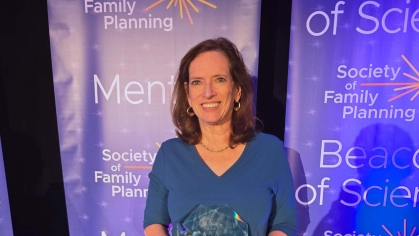
Laura Lindberg, a professor in the Department of Urban-Global Public Health at the Rutgers School of Public Health, has received the 2025 Mentor Award from the Society of Family Planning.

Laura Lindberg, a professor in the Department of Urban-Global Public Health at the Rutgers School of Public Health, has received the 2025 Mentor Award from the Society of Family Planning.

Following grants to examine the Los Angeles wildfires’ impact on wildfire-related respiratory health and air quality, Rutgers Health researchers have received additional funding from the National Institute of Environmental Health Sciences to establish a research program in collaboration with Rollins School of Public Health at Emory University.

Three faculty members from the Rutgers School of Public Health will be honored at the New Jersey Public Health Association’s (NJPHA) Annual Conference and Awards Ceremony on October 16, 2025. These distinguished awards celebrate exceptional leadership, service, advocacy, research, and collaboration, all of which strengthen and advance public health across New Jersey.

CenteringPregnancy is a prenatal care model combining education and individual health assessments in group settings for women at similar stages of pregnancy. A new evaluation by the Rutgers School of Public Health demonstrates that Centering fosters important social ties among expectant parents and provides opportunities for developing greater trust between health care providers and patients.

As lawmakers and public health experts debate the safety of nicotine pouches, researchers from Rutgers Health found that for now, most adults that use these products also have a history of tobacco use and may be choosing these products as a possible step toward reducing or quitting more dangerous forms of nicotine delivery.

Perry N. Halkitis, dean of the Rutgers School of Public Health, was recently named the recipient of the J. Michael McGinnis Leadership Excellence Award from the Interdisciplinary Association for Population Health Science (IAPHS) and will formally accept the honor next week at the IAPHS annual conference in Pittsburgh.